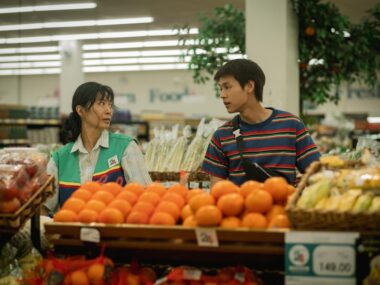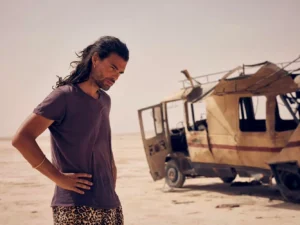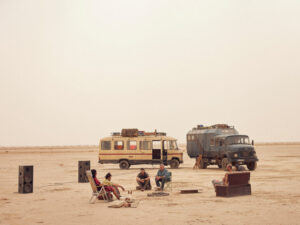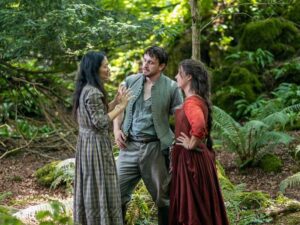Sophie Dersape is a Canadian director, screenwriter, director of photography, and producer who is renowned in modern Quebec cinema.
A TIFF favourite and the recipient of the ‘Best Canadian Film’ award for her 2019 movie Antigone, Sophie was officially invited to join the Academy of Motion Picture Arts and Sciences in 2020. In 2021, she received the coveted Compagne de l’Ordre des arts et des lettres du Québec from the Quebecois government for her contribution to the film industry.
On September 7, 2024, her latest feature film Shepherds (Berger) premiered at the Toronto International Film Festival. The narrative recounts the journey of Mathieu Lefebvre, a former executive-turned-shepherd, whose book served as the inspiration for the film’s plot.
The film stars Felix-Antoine Duval in the titular role of ‘Mathyas’, a young advertising executive from Montreal who abandons his prominent career to pursue Provençal shepherding and ends up encountering various misadventures with a civil servant who has cavalierly quit her job.
Naturally, Sophie once again received TIFF’s ‘Best Canadian Film’ award for Shepherds.
One Lash Shot had the opportunity to speak with filmmaker Sophie Deraspe about the behind-the-scenes of the transition from modernity to the romanticism of pastoralism in Shepherds.

If I am right, you read Mathieu Lefebvre’s book D’où viens tu, berger? in one sitting, and seriously considered making it into a movie in 2015. What about the book captivated you?
Well, first it’s the producers who had the rights and it is them who handed me the book that I read. Ok, so when I read the book, I felt that there really is a quest and that kind of existential quest speaks to me. Especially, when it is related to nature or us as biological beings or our interconnection with nature. Not only in a romantic way but in a very tangible, materialistic and also spiritual way. But the real physical matter was also something that spoke to me.
How did you go about choosing the two main characters of the movie— Felix-Antoine Duval as the protagonist and the herds of sheep that you worked with?
The casting of Felix-Antoine—I have to say, was a lot easier! (Laughs) We are able to meet with performers, do auditions, and communicate with them since we are well-organized when working on movies. They want to work with us and we want to work with actors. This is very natural. I met with many people in order to find the one that made me go like “Ok, he’s the one for the kind of adventure we are aiming at.” But it was done the traditional way.
With the sheep, it was a lot more complicated because they require year-round organizing and shooting them is completely different. They have their own needs and obligations regarding seasons and the needs of the animals— where they have to be at a certain time and space, according to when they reproduce. Even for eating in the south of France during winter is alright, but they have to move during summer because it’s way too dry over there. Some move by trucks; actually, most of them move by trucks now. But they used to do it by walking. Of course, we were interested in doing it via the traditional way of walking which involves many days of walking with the herd. Your connection with tradition and the traditional way of doing things involves working with different elements. It’s completely different from changing your location simply by a truck or by a car.

Even if it’s done by truck, once they are in the mountains, they have to walk. And, the organization required for walking with a herd is tremendous. Because, during those days they have to find grass— they have to be fed. But then you cannot eat in the field of some peasant who is doing his own thing. There is organization required as to where they will be fed and where they will sleep during transit. When you add it to the organization of shooting which is tremendous in effort, it becomes complicated.
We had to find the sheep according to the willingness of their shepherds or herders to participate in the film. We had to make a deal with them like “Ok, we will manage according to you, but can you please manage a little bit according to us?” (Laughs) We really to know when the transhumance process starts. So, we needed to agree on a date.
In a documentary, you can wait. Because, when you are shooting with 3-4 people, you pay the 3-4 people for waiting. But in a feature film, it’s a bit difficult to pay around 40 people for waiting.
You had to prepare a year in advance for all those herds to have the same stamp in the stunning transhumance scene. The stamp is a non-toxic paint that stays with the animals until they are sheared. How did you convince the shepherds to allow the stamping process?
Yes, absolutely. It’s a mix of— “I listen to you, your needs, I listen to how you do your things, I really respect that. Now, these are my needs— can we do something in between?”
I think it works because at first, I leave them the privilege of being the professionals regarding the sheep. We are the professionals regarding filmmaking. But the priority is your sheep and what you have to do because, after we are done, you have to continue with your care, work and business.

So, I think that’s how we always manage to let them know, you are the priority. So that’s our way of approach. We would propose such a design. And the guy would say, “No, I don’t want those letters! They don’t concern me!” (Laughs)
With some of them, it’s easy, but with others, it becomes a diplomacy discussion. Sometimes we end up with a surprise— they did the stamp, but it’s not the right stamp and we have to deal with that! (Laughs) Then what do we do? Do we allow the sheep to have a stamp that is not exactly the same — perhaps, yes, we can allow that. That’s how it works.
Climate change plays a huge role in Berger. The real shepherds who enable transhumance in the mountains are probably dealing with a very different scenario today than when the book was written. How did you capture the turbulence faced by the front-line shepherds in such a scenario?
In terms of climate change, of course, it’s in the way they speak about the fact that there is no water anymore where there used to be a spring of fresh water for centuries or from generation to generation they used to go there— but suddenly there is no water or it’s just really less water.
So, with the dialogues you realize that, but it’s also by deciding with the director of photography, how is it going to look in image form? Because, in film, we get to decide if it’s going to be warmer or if it’s going to be colder. Like the colours we will have on screen, the way we will do the colour grading is decided right at the beginning. We emphasize those things—even in costumes, the colour of the walls or when we decide on the location where we are going to shoot where the grass is kind of yellowish or it’s not really green. If there is a storm on location, when the animals walk, we hear a sound that’s different from when they walk on the grass. So, all those little things inform us of the changes in a subliminal way.
How did you film the scenario where Felix-Antoine’s character was trapped in the rainstorm while attempting to locate the sheep?
Thunderstorms are experienced by most people who live in the mountains. We had to halt shooting as a crew when it happened suddenly. We had to hide to protect ourselves. We were not in the same place. Some were in cars; others were in a cabin. We had to wait until it was over and we didn’t know how long we would have to wait. Usually, a thunderstorm does not last for hours and hours. But still, we had to stop shooting, which proved to be costly. Because, when you are shooting, every minute has a cost. So, when you have to stop shooting for two hours, it’s inevitable due to security reasons.

The boom is a stick made of metal. The tripod, the camera— you cannot use those instruments in a thunderstorm. And, the person who is operating the camera, cannot be caught in it either.
So, most of it was enabled using special effects. Which is hard to believe, because many amazing things in this film are real. Like the number of sheep— when we walk with 3000 sheep, it is real. Which is impressive in itself. Therefore, when we use special effects for thunderstorms, I think people are confused. They still feel that they are in this reality.
What was your favourite scene in the movie?
I have many favourite scenes. I really like the birth of the lamb. It’s something that really happened and we had to be flexible enough to capture it, be it with the actor or the crew. And, we succeeded and I felt like “Yes!!”.
For a fiction film to be able to move fast enough, to be flexible enough and for Felix-Antoine to be generous enough to give us his emotion during that moment, was phenomenal. Of course, we have to improvise in that specific moment because life is happening and we don’t know what the next minute is going to look like. Is she going to make it? Is she going to still be alive in 10 minutes or 60 minutes or tomorrow? There were a lot of factors involved in it.

Then the scene where the old lady is giving the scarf to the girl during the transhumance process— it had to be choreographed. Because it happens when the herd is going through the village and it happens only once! You cannot ask the herd to do it a second time. So, the choreography of that was also very important and it had to be captured aptly, tracking the camera at every specific moment when the herd went through the village. So, there was a lot of adrenaline too! We had to be fast enough and do it well— all in one shot. Then we continue because we need to grab the shots of the herd going through the cars and the driver is honking, mad that he has to stop for a while till the time the herd has passed the village. And, all those moments were choreographed and it was pretty much action for us.
Do you think it’s actually feasible even today — this idea of changing your life and going for something absolutely different—leaving a high-profile career and becoming a shepherd?
Absolutely, it is— yes, yes, yes! I would even think maybe even more.
I think the pandemic changed something in a lot of us. Because, we realized that the world stopped in many fields and some of us were just pushed into the self-reflection mode. What I was doing in an automatic manner, now that it’s not there anymore, I have to figure out my life. Maybe I am not absolutely obliged to do it the way I used to do.
The world changes and I too, changed. Many people decided to go live in the country, many decided to grow a garden, many decided to leave their office work. But I am not saying that office work is bad— some people are happy living in the city.
But ultimately, you have the right to consider doing something else. You have the right to follow what you want. It might not be as complicated as you imagine to change your life.
I mean, life won’t be easy just because you decide that you want to live with the animals in the mountains. But, if it feels like this is the place you want to be in, you will find a new energy to go through more difficult things. Especially, if you feel like it’s the right space for you.

[Author’s Note: Merci beaucoup, Sophie! I can’t wait to watch your next film☺]










